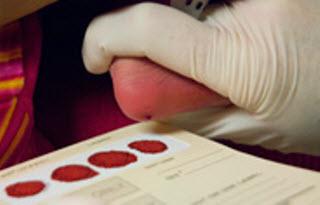- Home
- News
- Screening Matters, Issue 41, August 2013
- Congenital Hypothyroidism
News
- Screening Matters Newsletter
- April 2019
- April 2018
- December 2017
- August 2017
- April 2017
- December 2016
- October 2016
- March 2016
- November 2015
- August 2015
- June 2015
- April 2015
- February 2015
- December 2014
- October 2014
- August 2014
- June 2014
- April 2014
- February 2014
- December 2013
- October 2013
- August 2013
- June 2013
- April 2013
- February 2013
Screening Matters
The National Screening Unit newsletter
Congenital Hypothyroidism

A blood test is carried out at 48 hours after birth, or as soon as possible after this. Almost all babies in New Zealand are screened, and early detection can prevent severe disability and death. Approximately 45 babies a year are identified through screening with one of the conditions.
One of the most prevalent disorders is Congenital Hypothyroidism (CH) with over 20 babies diagnosed each year with this condition. If left untreated, CH leads to irreversible intellectual impairment, hearing abnormalities and growth failure. Treatment involves early levothyroxine therapy which leads to significant improvement in neurocognitive outcomes. There are however, continued reports of mild neurocognitive impairment in children with CH.
While it has been suggested by international experts that this lack of neurocognitive normalisation is due to inadequate thyroid hormone before birth and therefore permanent, it is also possible that more rapid diagnosis of congenital hypothyroidism after birth and a more aggressive initial thyroid replacement regimen would lead to an improvement in neurocognitive outcomes to perhaps normal cognition in later life.
The Ministry of Health funded a study led by Associate Professor Paul Hofman of the Liggins Institute, University of Auckland, to understand whether the current screening strategy and treatment model (rapid institution of high-dose levothyroxine replacement producing prompt normalisation of thyroid function) in Auckland is effective in preventing developmental and growth disorders; and to determine whether the early high dose treatment used in this region can lead to normalised intellectual function.
The study identified children aged 4 to 18 years of age diagnosed with CH through the newborn screening programme. A series of neurocognitive tests were performed on the children with CH and a control group of siblings with no known developmental problems. The population consisted of 44 CH cases who were screened over the period 1993 to 2006 and 53 siblings.
The results found that overall, IQ was similar among CH cases and controls and there were no differences in motor function between groups. Severity of CH did not influence outcomes, but greater time to normalise free thyroxine was associated with worse motor balance.
The findings suggest that a strategy of rapidly identifying and treating infants with CH using high dose levothyroxine replacement is associated with normal intellectual and motor development. The study also highlights the importance of a close liaison between the screening service and the paediatricians caring for these conditions to ensure early, effective therapies.
The study has been published in the Journal of Clinical Endocrinology and Metabolism (JCEM). The journal article can be viewed at http://jcem.endojournals.org/content/early/2013/07/16/jc.2013-1903.abstract
To receive the Screening Matters newsletter by email, fill out our sign-up form.

